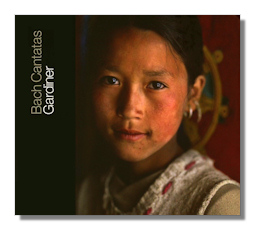
The Internet's Premier Classical Music Source
Related Links
- J.S. Bach Reviews
- Latest Reviews
- More Reviews
-
By Composer
-
Collections
DVD & Blu-ray
Books
Concert Reviews
Articles/Interviews
Software
Audio
Search Amazon
Recommended Links
Site News
 CD Review
CD Review
Johann Sebastian Bach

Cantatas, Volume 11
Genova/Greenwich
- Ach! ich sehe, BWV 162 1
- Ich geh und such, BWV 49 1
- Schmücke dich, BWV 180 1
- Ich glaube, liber Herr, BWV 109 2
- Aus tiefer Not, BWV 38 2
- Was Gott tut, BWV 98 2
- Ich habe meine Zuversicht, BWV 188 2
1 Magdalena Kozena, soprano
1 Sara Mingardo, alto
1 Christoph Genz, tenor
1 Peter Harvey, bass
2 Joannne Lunn, soprano
2 William Towers, alto
2 Paul Agnew, tenor
2 Gottholt Schwarz, bass
Monteverdi Choir
English Baroque Soloists/John Eliot Gardiner
Soli Deo Gloria Records SDG168
The "pilgrimage" which the Monteverdi Choir, English Baroque Soloists and John Eliot Gardiner undertook with various solo singers during 2000 has so far yielded a couple of dozen CDs. In other words, they are nearly all released. This, Volume 11, is one of the last. Note that the volume numbers bear no relation to either the time of year for which the cantatas were intended and when they were thus performed during 2000; or to the order in which they have been released. These are for the twentieth and twenty-first Sundays after Trinity, which fall in October and were recorded in Genova and Greenwich respectively.
BWV 162, Ach! ich sehe, itzt, da ich zur Hochzeit gehe, was written originally for Weimar in 1716 and recopied for performance during Bach's years at Leipzig less than ten years later. Its somewhat sober tonality and melodies belie the joyous and potentially "sensuous" wedding messages. The balance that Gardiner achieves between focus and celebration is typical of his sense of control – but a control expanded to re-inforce the junction of text and music which holds good throughout the entire project.
BWV 49, Ich geh und suche mit Verlangen begins with a lengthy sinfonia which Gardiner takes at an appropriately spritely tempo. The prominence of the instruments continues; this dialog cantata follows the theme of love as a duet between bride and groom, the church and Christ. Again, a superb balance has been struck which consciously allows enough of the joy to make it credible to inform the contract. BWV 180, Schmücke dich, o liebe Seele also has a long opening movement which – in common with the rest of the cantata as well – is highly celebratory. But never for its own sake. Bach's determination not to temper, but to pull out, the underlying reasons for joy are always fully realized by both these vocal and instrumental soloists.
The next leg of the pilgrimage was to have been northeastwards from Italy to the Baltic. When it was canceled, the largely British and British-based musicians found themselves back in London. The excellent acoustic of the Old Royal Naval College Chapel in Greenwich made up for the setback, though. BWV 109, Ich glaube, liber Herr, hilf meinem Unglauben! covers ground (the conflict between belief and doubt) familiar to Bach. Once again, instruments re-inforce the theme: concerto grosso-like opposition between concertisti and ripienisti. And once again, Gardiner ensures that spectacle doesn't suppress substance. BWV 38, Aus tiefer Not schrei ich zu Dir is a chorale cantata from 1724 based on the Lutheran hymn; it has the potential for maudlin and self-indulgence, which Bach avoids completely – and which these musicians also support, again by focus and self-awareness.
BWV 98, Was Gott tut, das ist wohlgetanis shorter and more self-contained. It too is based on a total belief in the omnipotence and benign intentions of God. To communicate such faith is actually harder the shorter the text. Once more, Gardiner and his musicians hit the right spot exactly. The two-CD set closes with BWV 188, Ich habe meine Zuversicht, which opens with another sinfonia, based on the familiar third movement of the D minor harpsichord concerto, BWV 1052. Then the immensely uplifting and memorable tenor aria, Ich habe meine Zuversicht ("I have put my trust in God"); this cantata seems to sum up the rather subtle theme of this entire release – not that it was a conscious one on Gardiner's part – faith by exuberant revelations that are alternatives to actively seeking it head on.
As usual with this series, the playing is exemplary in every way. Significantly, the technical achievement is taken for granted and is fully in service of the expression and communication of Bach's intentions. The players' facility with phrasing, tempi and interpretative poise even manage to see beyond the rush in which Bach was often forced to compose these amazing works. The acoustic, as has been implied, is good in both locations on these CDs and enhances the atmospheres in which the performances took place. As usual, extracts from Gardiner's pilgrimage journal provide a most insightful commentary both to the works and how they were performed, in November 2000. The texts are reproduced in full – in German with English translations. Altogether this is a highly recommendable release. Essential if you're collecting the SDG series.
Copyright © 2010, Mark Sealey.





















